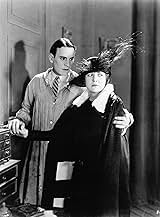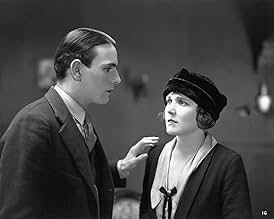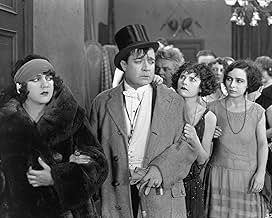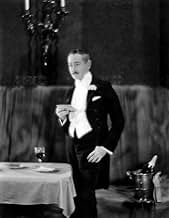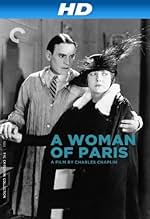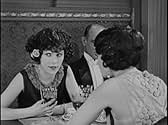NOTE IMDb
6,9/10
6,6 k
MA NOTE
Une femme attachée au train de vie que lui offre son mari rencontre son ancien fiancé et se retrouve tiraillée entre l'amour et un certain confort de vie.Une femme attachée au train de vie que lui offre son mari rencontre son ancien fiancé et se retrouve tiraillée entre l'amour et un certain confort de vie.Une femme attachée au train de vie que lui offre son mari rencontre son ancien fiancé et se retrouve tiraillée entre l'amour et un certain confort de vie.
- Réalisation
- Scénario
- Casting principal
- Récompenses
- 3 victoires au total
Charles K. French
- Jean's Father
- (as Charles French)
Nellie Bly Baker
- Masseuse
- (non crédité)
Henry Bergman
- Head Waiter
- (non crédité)
Charles Chaplin
- Station Porter
- (non crédité)
Frank Coghlan Jr.
- Boy
- (non crédité)
Antonio Corsi
- Accordion Player
- (non crédité)
Harry d'Abbadie d'Arrast
- Man in Nightclub
- (non crédité)
Stella De Lanti
- Revel's Fiancée
- (non confirmé)
- (non crédité)
Jean de Limur
- Man in Nightclub
- (non crédité)
Charles Farrell
- Man in Nightclub
- (non crédité)
Bess Flowers
- Mannequin
- (non crédité)
Avis à la une
If nothing else, you have to give Charlie Chaplin a lot of credit for taking a shot at something so different from his usual fare. (Though he himself only appears on-screen for a few seconds this time, he did almost everything else in the production.) And while "A Woman of Paris" is certainly a cut below his comedy features, it's a pretty good melodrama, and you'd have to think that with experience Chaplin could have gone on to become almost as effective with straight melodrama as he was with his sentimental comedies. It's not really surprising that after this he returned to comedy for good, but that was just to keep audiences happy, not because he couldn't do drama, since this is a decent effort.
Chaplin's own frequent lady Edna Purviance is convincing as the young woman whose tangled love affairs pull her away from her true love and into a set of tangled relationships in the empty, decadent world of the Parisian idle classes. Except for being rather contrived - there are far too many coincidences and pat developments in the plot, and they do not work as well in serious drama as they would in a comedy - the story is interesting and fairly creative. It does get a bit heavy at times, since there is very little comic relief, but Adolphe Menjou helps keep it from getting unbearably serious with a good performance as the carefree, irresponsible Pierre. He shows that even without dialogue he can make this kind of character lively and memorable.
Since it doesn't quite measure up to the standard of either the best Chaplin features or the best silent melodramas, "A Woman of Paris" may not have a niche of its own, except for its historical interest. But it's quite an interesting change of pace from Chaplin, and an above average movie that's worth seeing.
Chaplin's own frequent lady Edna Purviance is convincing as the young woman whose tangled love affairs pull her away from her true love and into a set of tangled relationships in the empty, decadent world of the Parisian idle classes. Except for being rather contrived - there are far too many coincidences and pat developments in the plot, and they do not work as well in serious drama as they would in a comedy - the story is interesting and fairly creative. It does get a bit heavy at times, since there is very little comic relief, but Adolphe Menjou helps keep it from getting unbearably serious with a good performance as the carefree, irresponsible Pierre. He shows that even without dialogue he can make this kind of character lively and memorable.
Since it doesn't quite measure up to the standard of either the best Chaplin features or the best silent melodramas, "A Woman of Paris" may not have a niche of its own, except for its historical interest. But it's quite an interesting change of pace from Chaplin, and an above average movie that's worth seeing.
Charles Chaplin is noted for his comedy performances, and deservedly.
His direction, though, should be more highly regarded, if only for this one motion picture.
Compare the quality of the photography and the smoothness of the editing to, for example, "The Gold Rush," of about the same time.
"A Woman of Paris" is very modern; "The Gold Rush" is downright primitive (but, in spots, brilliant).
"A Woman of Paris" also shows some admirable acting talent in, really, all the players. Some of the lesser characters are still played beautifully, despite being "lesser," especially Marie's maids and her, more or less, friends, and very especially the masseuse.
And the scene where the artist's mother, played by Lydia Knott, bent on revenge, comes upon Marie -- with no words, just body movement and facial expression -- she tells the audience what the proverbial thousand words could not so well.
Credit for part of that good acting must, of course, go to the director, but even the best director can't make much of poor actors.
Chaplin had very good actors. Adolphe Menjou reached stardom, and deservedly. What a tremendous talent; he could do everything.
Edna Purviance should have achieved much more acclaim. She performed admirably, especially in this movie, and she was attractive. Fame is certainly fickle.
In some ways, "A Woman of Paris" might be written off by a few as "soap opera." But it is well worth watching for the performances and, especially, for the directing.
His direction, though, should be more highly regarded, if only for this one motion picture.
Compare the quality of the photography and the smoothness of the editing to, for example, "The Gold Rush," of about the same time.
"A Woman of Paris" is very modern; "The Gold Rush" is downright primitive (but, in spots, brilliant).
"A Woman of Paris" also shows some admirable acting talent in, really, all the players. Some of the lesser characters are still played beautifully, despite being "lesser," especially Marie's maids and her, more or less, friends, and very especially the masseuse.
And the scene where the artist's mother, played by Lydia Knott, bent on revenge, comes upon Marie -- with no words, just body movement and facial expression -- she tells the audience what the proverbial thousand words could not so well.
Credit for part of that good acting must, of course, go to the director, but even the best director can't make much of poor actors.
Chaplin had very good actors. Adolphe Menjou reached stardom, and deservedly. What a tremendous talent; he could do everything.
Edna Purviance should have achieved much more acclaim. She performed admirably, especially in this movie, and she was attractive. Fame is certainly fickle.
In some ways, "A Woman of Paris" might be written off by a few as "soap opera." But it is well worth watching for the performances and, especially, for the directing.
This is an exquisite film that needs to be seen with some understanding of the era in which it was made. It was a critical success for good reason, and it's ironic style and subtle acting was a great influence on directors such as Lubitsch. It was not a popular success in the US but was well understood and acclaimed as such in Europe. I notice that some reviewers decry it as melodrama, but there is no reason why melodrama should not be an acceptable form of art. I would urge viewers to immerse themselves more in the treasures of the silent cinematic era, as there are many lessons to be learned therefrom for today's aspiring artists in any medium.
'A Woman of Paris' is rather a curiosity in Charles Chaplin's filmography. It stands as the only pure drama he wrote and directed. The film he made just to help foster Edna Purviance's career independent from him. This film was Edna's first and practically the last leading role ('A Woman of the Sea' from 1926 was never released and is now considered to be lost), which, of course, is a pity, because besides being gorgeous, she was a fine actress, and was able to shine on her own not only as of the sidekick of The Tramp. The complex role Marie St. Clair proved that. The film itself was a failure at cinemas not because it was bad (critics at that time liked it), but because Chaplin wasn't in it (only for a brief cameo - a man carrying the box in the trainstation). And it was, oh the horror! a drama.
I guess that's the reason, why Chaplin never tried his hand at a serious movie ever again (although he experimented with quite risky stuff later in his career). That's another pity - because Chaplin truly knew how to create complex characters amid moral turmoils and dilemmas. 'A Woman of Paris' is undoubtedly with flaws. Well, it was practically Chaplin's second feature film and the first time where he ventured that far from his comfort zone.
Altogether, 'A Woman in Paris' is a good drama (probably a bit overly melodramatic by the end), and needs more recognition from Chaplin fans and all silent cinema admirers alike. It really shows that Chaplin was much more diverse and deep as a filmmaker than just offering magnificent laughs.
I guess that's the reason, why Chaplin never tried his hand at a serious movie ever again (although he experimented with quite risky stuff later in his career). That's another pity - because Chaplin truly knew how to create complex characters amid moral turmoils and dilemmas. 'A Woman of Paris' is undoubtedly with flaws. Well, it was practically Chaplin's second feature film and the first time where he ventured that far from his comfort zone.
Altogether, 'A Woman in Paris' is a good drama (probably a bit overly melodramatic by the end), and needs more recognition from Chaplin fans and all silent cinema admirers alike. It really shows that Chaplin was much more diverse and deep as a filmmaker than just offering magnificent laughs.
A Woman Of Paris was an acclaimed success with the critics when it was Originally released on 1st October 1923. However, the audience despised it as they wanted to see Charlie Chaplin the tramp starring in a film not a film directed by Chaplin in which he does not appear (albeit in a small cameo role). When i first saw the film on BBC2 around Christmas 1998 i thought Chaplin had a starring role so was naturally disappointed when i found out this wasn't the case. However, since then i have become a huge fan of Chaplin and all his work so now I think this film is rated among Chaplin's best features. His musical score composed in 1976 with Eric Rogers was Chaplin's last ever work in his film career which spanned 62 years. By 1976 Chaplin was very frail and struggled to communicate so the fact that he could compose the music for a near 80 minute film is amazing and the fact that the music score is as good as any of his other films is also astonishing. Charles Chaplin was a true genius of Cinema and A Woman Of Paris is an excellent example of Chaplin as director, writer and composer.
Le saviez-vous
- AnecdotesThe reissue of this film, with a musical score and new cut by Sir Charles Chaplin, was the last work of his entire film career. By then, the 87-year-old Chaplin was visibly frail but still walking. His score was aided by arranger Eric James, and he took a small theme from Monsieur Verdoux (1947), but most of the score was Chaplin's. The film was reissued posthumously in 1977 with the new score to overwhelming critical and public praise. At that time, many critics praised it (as in the trailer) as one of the best films ever made.
- GaffesWhen Jean starts fighting with Pierre in the restaurant, Pierre's glass of wine or champagne gets knocked over. When Pierre sits down on the table afterwards, the glass stands on the table filled with drink as if it hadn't been knocked over.
- Citations
[Intertitle]: Time heals, and experience teaches that the secret of happiness is in service to others.
- Versions alternativesDuring 1976, Chaplin was preparing a reissue of A Woman of Paris/Sunnyside but died before completion. The project was completed after his death, and the films were reissued in the United States by Kino International Corp. in 1978. This version, however, dispensed with an opening subtitle, as well as a few brief insert shots.
- ConnexionsFeatured in Chaplin Today: Modern Times (2003)
Meilleurs choix
Connectez-vous pour évaluer et suivre la liste de favoris afin de recevoir des recommandations personnalisées
- How long is A Woman of Paris: A Drama of Fate?Alimenté par Alexa
Détails
- Date de sortie
- Pays d’origine
- Site officiel
- Langue
- Aussi connu sous le nom de
- Una mujer de París
- Lieux de tournage
- Société de production
- Voir plus de crédits d'entreprise sur IMDbPro
Box-office
- Budget
- 351 000 $US (estimé)
- Montant brut mondial
- 12 921 $US
- Durée1 heure 22 minutes
- Mixage
- Rapport de forme
- 1.33 : 1
Contribuer à cette page
Suggérer une modification ou ajouter du contenu manquant

Lacune principale
By what name was L'opinion publique (1923) officially released in India in English?
Répondre
